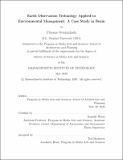Earth observation technology applied to environmental management : a case study in Benin
Author(s)
Ovienmhada, Ufuoma.
Download1193022514-MIT.pdf (61.28Mb)
Other Contributors
Program in Media Arts and Sciences (Massachusetts Institute of Technology)
Advisor
Danielle Wood.
Terms of use
Metadata
Show full item recordAbstract
Coastal ecosystems provide habitats for a wide variety of plant and animal species. They also provide many benefits to humans in the form of transportation, subsistence, and economic opportunity. These benefits are at risk due to both anthropogenic and naturally-occurring environmental harms. Effective management of these environmental harms is important to protect the ecological balance of an ecosystem and the benefits that humans derive from them. Decision Support Systems (DSS) enabled by environmental and socioeconomic data can help inform effective management. However, data cannot always be incorporated into the decision-making workflow for a multitude of reasons from awareness, to interpretability, accessibility and cost. The research outcomes presented in this thesis address processes that (1) enable a stakeholder to set priorities for the design of a DSS and (2) utilize earth observation technologies to enable low cost data collection of parameters relevant to a stakeholder. These processes are studied through a case study on Lake Nokoué in Benin Republic with the stakeholder Green Keeper Africa (GKA), a social enterprise located in Benin. Lake Nokoué faces several challenges with sustainable water management due to an invasive plant species known as the water hyacinth, and anthropogenic pressure from population growth and lake-dependent economic activities. Earth Observation technologies are applied to demonstrate (1) a method for detection and long-term analysis of water hyacinth growth trends, (2) a method for detection of a traditional fish farming practice, (3) a method for long-term water quality sensing and (4) methods for validation of all data results. The results of this thesis show progress towards creating a multi-data stream DSS that can be used by GKA, government, and community members to engage with the Lake in a manner that preserves the lake's health while protecting the ecosystem services of the surrounding human populations.
Description
Thesis: S.M., Massachusetts Institute of Technology, School of Architecture and Planning, Program in Media Arts and Sciences, May, 2020 Cataloged from the official PDF of thesis. Includes bibliographical references (pages 147-153).
Date issued
2020Department
Program in Media Arts and Sciences (Massachusetts Institute of Technology)Publisher
Massachusetts Institute of Technology
Keywords
Program in Media Arts and Sciences